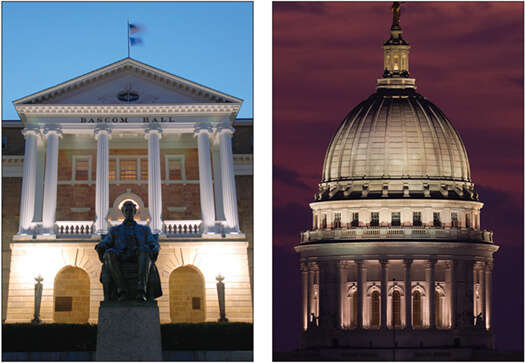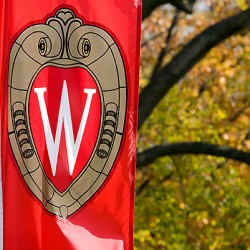Bipartisan Partners
Chancellor Biddy Martin believes that UW-Madison can help Wisconsin on the road to financial stability. The best path, she says, lies in greater flexibility for the university.
Biddy Martin PhD’85 has spent her entire career in higher education, and the experience has taught her to keep an eye on her peer institutions.
“The university,” she says, “is not just another state agency.”
Lately she’s been saying this often — to alumni, faculty, students, donors, and especially state politicians. She wants them to remember this message, because she senses change in the air.
“The financial model for public research universities is broken,” she says, and this “requires changes in the traditional partnership” between state governments and the schools they sponsor. This is true all over the United States, she believes, though her focus is on UW-Madison, where a decreasing share of the budget derives from state funds.
As recently as fifteen years ago, money from state tax revenue accounted for some $333.9 million, more than 30 percent of UW-Madison’s budget. By 2009–10, the number of state dollars increased to $457 million, but the amount supporting core mission activities has declined. Further, the university’s budget has grown faster than state contributions, and today the state’s contribution is only about 18 percent of UW-Madison’s income. Because Wisconsin faces a looming budget deficit as it tries to climb out of the recession, the percentage of state funding is likely to decrease in the foreseeable future.
And so Martin is proposing that the UW and Wisconsin rewrite their relationship. Over the last few months, she has been talking about a new partnership — the New Badger Partnership (NBP), as she calls it — in every forum she can find: through articles and interviews; in speeches to students, faculty, and staff; and in conversations with alumni, business leaders, and the leadership of Wisconsin’s state government.
The essence of the partnership is that the state and its flagship university should work hand in glove to improve the general wealth and welfare of the state and its citizens. To that end, NBP would aim to make the university better able to deal with reductions by offering increased flexibility. It’s a partnership, Martin believes, that would make people happier at both ends of State Street.
The New Badger Partnership is centered on flexibility: to gain more control over its own revenue and expenses, the university would like to have greater ability to manage its budget, especially in four areas: tuition authority, governing personnel and salaries, managing contracts for construction and capital projects, and procuring supplies and equipment. But if the proposal is new, the four requests embedded in it aren’t; UW-Madison has desired change in each of these areas for decades.
“The New Badger Partnership includes things the university has wanted for a long time,” says Darrell Bazzell ’84, UW-Madison’s vice chancellor for administration and the person who oversees issues of personnel and budgeting. “But this is the first time we’ve made a strong case for an integrated, comprehensive plan.”
Bazzell was part of the committee that conceived of NBP, a group that included Vince Sweeney ’78, UW- Madison’s vice chancellor for university relations. The group began work nearly two years ago, as the depth of the recession was becoming clear and as the political situation in the Capitol became less stable.
“This really began shortly after Governor [Jim] Doyle [’67] announced he wasn’t running for re-election, back in August of 2009,” says Sweeney. “We saw that this was an opportunity: for the first time in many years, we knew for certain that there would be a new administration, whichever side won the [2010 gubernatorial] election. We knew that we would have the chance to establish a new relationship with each candidate, and we knew that there would be a fight over the budget. We wanted to prevent UW-Madison from being made into a political football during the budget process.”
That budget process promises to be difficult. According to an analysis by Andrew Reschovsky, a professor in the UW’s La Follette School of Public Affairs, Wisconsin faces a deficit that may be as large as $3 billion over the coming biennium, more than 10 percent of the state budget’s general fund each year.
Knowing that Wisconsin would face a sizable deficit, Sweeney, Bazzell, and others looked at what UW-Madison might want and need, and at ways that public universities in other states were dealing with their own legislatures and similar financial difficulties. (See chart, below.) They found that other states were responding to budget crises by trying to operate more efficiently. Picking the items they liked from among these state’s plans “almost a la carte,” according to Sweeney, they found options that could aid the UW.
“We knew there would be no more money coming from the legislature,” he says, “so we figured the answer was to ask for flexibility.”
Over the following months, they sought input from various parties — students, faculty, donors, and legislative candidates. “They all seemed intrigued,” Sweeney says.
From December 2009 through February 2010, as Wisconsin’s gubernatorial race was heating up, Martin met one-on-one with the three leading candidates, Democrat Tom Barrett ’76, JD’80, and Republicans Mark Neumann and eventual winner Scott Walker, and shared her vision. Throughout these conversations, Martin made sure to point out that the UW wants to cooperate with the legislature — not obstruct it — and that it can be an asset to Wisconsin’s economy, not a drain for dollars.
“I … emphasized the importance of UW-Madison’s economic role in the state, the fact that we are a thriv- ing export business for Wisconsin, bringing in well over a billion dollars a year from outside the state, creating public- and private-sector jobs with our research and discovery,” she says. She found a receptive audience and says that Walker “seemed committed to bold ideas about how to grow the state’s economy, create jobs, and take advantage of the asset that higher education represents.”
As Walker and his new Republican majority approach the task of tackling a state budget for the 2011–13 biennium, proponents of the New Badger Partnership hope that they have opened the door to negotiating a better relationship between the state and university.
“The idea was not to develop a plan and put it on the table,” Sweeney says. “Rather, we wanted to put some ideas out as a way of shaping the conversation. We wanted people to think about what we need to do to preserve and protect the university as a world-class institution.”
As a result, NBP is far from a detailed program. Instead, it currently exists as a set of principles, to which Martin, Sweeney, and the partnership’s supporters hope the new governor and his legislative allies will respond favorably
Flexibility, NBP backers argue, will enable the university to reap financial dividends. For example, notes Alan Fish MS’01, UW-Madison’s vice chancellor for facilities planning and management, consider the university’s Microbial Sciences building, which opened in September 2007 to great fanfare. Microbial Sciences is a $121.3 million, state-of-the-art facility for conducting microbiology, immunology, and food safety research — and a key element in the state’s BioStar Initiative, an effort launched more than a decade ago by Governor Tommy Thompson ’63, JD’66 aimed at making Wisconsin a center for research in biology and biotechnology.
As with all state construction projects, regulations specified that the UW had to request separate bids from contractors for construction, electrical work, plumbing, and mechanical systems, and then take the lowest bid for each job. The rules are designed to save state money by taking the least expensive contractors, but in practice, they sowed confusion and produced a bureaucratic headache. When the university took possession of Microbial Sciences, it discovered that the work done didn’t meet the needs of the scientists whose labs were to be located there.
“It took us fourteen months and $1 million to fix the errors,” says Fish. He believes that NBP, by freeing the university from state rules on hiring contractors, could avoid repeating such mistakes.
Still, the key to convincing Walker and legislative leaders to support NBP is making them see UW-Madison as Martin does: as not just another state agency. NBP proponents argue that a more flexible university would not only help ease the state’s budget woes; it would also foster a higher-quality institution. The university faces forms of competition that the rest of state government doesn’t, and the UW wants to keep the student, faculty, and research talent that will let it thrive.
“Think of the Department of Natural Resources, for example,” says Sweeney. “Wisconsin’s DNR isn’t competing with Illinois’ DNR. But the UW is in direct competition not only with the University of Illinois in Champaign, but with the best universities all over the world — for faculty, for students, for federal dollars, and for private sector dollars. We’re in a very competitive marketplace. With the DNR, other states aren’t trying to actively recruit their leadership, but other institutions around the world are trying to recruit ours. To maintain excellence, we have to be able to better deal with that competition for talent.”
And excellence is ultimately what the university believes it offers the state. “The UW has an important impact in the state of Wisconsin, an economic impact,” Sweeney says. “The $1 billion in research funding we brought in last year — that’s money brought into the state, jobs that we’ve created. The point of the New Badger Partnership is to try to preserve that impact, because Madison really is part of the solution.”
Martin believes that the need for change in Wisconsin’s relationship to its flagship university is growing more acute.
“Given the state’s budget deficit, global economic changes, and the state’s consequent need for a world-class research university as it builds its knowledge-based industries, it is time to do more than tinker on the edges,” she says. “The state needs bold thinking about how it can preserve the quality of UW-Madison, one of its primary economic drivers.”
John Allen is senior editor for On Wisconsin.
Published in the Spring 2011 issue




Comments
Debbie M. Meltzer (76) February 17, 2011
I commend the NBP for having a plan in place. I graduated and have worked at UW for a long time and have witnessed the “hoops” and barriers for getting things done. With the economy worsening, I believe this is a true example of “forward thinking”.
Mitchell Brauner March 2, 2011
Dear Chancellor Martin,
I was very interested read Chancellor Martin’s comments on the Governor’s budget proposal and NBP, and in her address to the Board of Regents last Friday. I have a few of comments, one of which is the caution: be careful what you wish for. I am an alumnus of UW-Madison (UW), holding two bachelor’s degrees. I am a parent of a current student, and I am a member of the faculty at UW-Milwaukee (UWM). I applaud the initiative that she has taken in proposing public authority for UW. Unfortunately, she has been co-opted by the Governor and his staff into supporting a proposal, which, on the face of it, would place UW in a more advantageous position than it has today to support its mission but in fact will ultimately pit the other UW System (UWS) campuses against UW. In the past it has been very clear who wins in such competition, and there is no reason to assume that the outcome in the future will be any different. It is not so much that UW will not benefit from separation but that the fate of the other campuses will be in ultimate jeopardy.
I am thinking primarily of my own campus. While it is true she paid lip service to the higher profile UWM has achieved and is achieving as research institution, but as a separate entity with a totally separate overseeing governance board UW will clearly be put against UWM for precious research dollars. UWM’s position among both the national and international academies and within the UW system is precarious at best, and with its own possible spin off under a public authority, without a significant endowment, might be academic suicide. It would be very easy for the state to declare that a second research institution is simply not needed and for UWM to be reduced to a four-year campus much like any other, and our graduate and research programs eliminated. In framing a proposal that would separate UW from UWS without consultation or inclusion of any other entity other than UW’s own campus administration Chancellor Martin fell right into the hands of a governor who will frame the proposal in his own way—a governor who despite words to the contrary has never had the best interests of either UW, UWM or UWS at heart during his career as a legislator or county executive. He has over the last two months clearly demonstrated that his method of governing does not include debate or compromise, and the majority in legislature will go along with anything he says and proposes. I would remind everyone that this governor did not finish college, as did not a number his fellow party members in the legislature, and what college he did attend was at a private school and a geographical rival to UWM.
It was very interesting to hear the comments of Regent Loftus last Friday regarding the re-balkanization of the Balkans in the 1990s. The balkanization of the UWS may ultimately have beneficial effects for all of the campuses, but to begin that process piecemeal, as Martin has agreed to, will have nothing but devastating effects for all except possibly UW. Separation will leave the rest of us as sitting ducks for the whimsy of the politicians in power. However, I think I understand the position well. UW, since the merger of the Wisconsin State Universities with UWS, has always felt that the other campuses were an imposition on its freedom. Moreover, since the creation of UWM as a satellite of UW in 1956, the senior institution has done its best to keep the junior in a subservient position. This may be the ultimate action to make this relationship permanent.
I end with the words with which I began this message: be careful what you wish for; you may succeed beyond your wildest dreams.
Respectfully
Mitchell Brauner ’67, ’69
Kent Archie March 8, 2011
I read the article which repeatedly mentioned that the Chancellor needs “flexibility”. But it never tells me what that means. Our previous US President said he needed “flexibility” to protect us from our enemies and we end up with wiretaps without warrants, people imprisoned offshore without charge or trial and other abuses of power. Does the Chancellor (like the Governor) want the authority to remove unions. Maybe raise tuition, remove tenure, issue no-bid contracts, favor out-of-state students over residents, because they bring in more money? I find this proposal frightening without much more detail.
Kent Archie ’77, ’81
Kate Dixon March 8, 2011
Many questions from alumni and others are now addressed in a new set of Frequently Asked Questions and answers: http://budget.wisc.edu/new-badger-partnership-faq/
Andreas Ostenso March 27, 2011
I “sifted and windowed” through much of the New Badger Partnership FAQ. To put it bluntly the NBP stinks to high heaven, if for no other reason that it has gotten Walker’s blessing. While I realize that this is a weak argument per se, the reality is that no one really knows what is going on, except for the people proposing this change. The haste with which this is proceeding ought to be enough give anyone pause, especially given divisive and heavy handed approach being used by Walker in his other endeavors. Frankly, Walker et al (and this now includes Chancellor Martin), have lost any goodwill and more importantly, any credibility.
As for the merits of the plan itself, it’s about par or the course. Neo-con, neo-liberal. Whatever. The term “flexibility” is kicked around a lot these days. Best I can tell it means busting unions in order to get some short-lived and one-time savings while reducing oversight. The State of Wisconsin, in turn, can continue to whittle away at it’s support and still have it’s brand on what used to be UW-Madison. Everybody wins, right? The Walker approach of divide and conquer seems to have seduced Chancellor Martin as well. The least the Chancellor could do is be honest about it and give the place a new name, something like “The University Formerly Known as the University of Wisconsin-Madison.”
I will finally add that “On Wisconsin” and the WAA have been a tremendous disappointment. This mealy-mouthed article could have at least said things the way they are; Wisconsin as a state, as a people and as a government, have failed to live up to it’s higher education obligations. It’s clear that Walker, a drop-out himself without the foggiest idea of UW’s greater role in society, wants to have his cake and eat it too. Namely, he wants all the benefits of a world class university but don’t want to pay for it. On the one hand, given the challenging situation the UW is in right now, it is hard to fault Chancellor Martin for taking the low road. However, WAA’s apparent support of this race to the bottom is just distasteful.